The Great Chain: Objectivism in Bioshock
By gamer_152 3 Comments
Note: The following article contains major spoilers for Bioshock and Atlas Shrugged and minor spoilers for The Fountainhead.
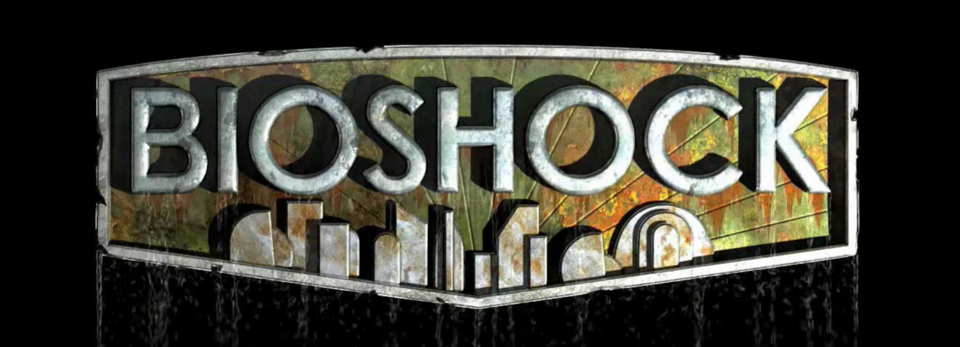
"The creator served nothing and no one. He had lived for himself."
-Howard Roark, The Fountainhead[1]
As the years go by, games date. They rust and rot, and what once seemed like a fluid system of interaction can decay into something clunky and shiftless. Touches that were revolutionary in their day become moth-eaten or discarded to the scrap pile of the medium's history. But now and then, a game comes out that doesn't just stand the test of time but also sets a bar by which other games angle their ambitions for years to come. To this day, there may be no other game that has expressed the history of its setting through design, audio logs, and world-building as deftly and vigorously as Bioshock. It's fair to say that Irrational's morbid dystopia of Rapture has left a mark, but as a political treatise, Bioshock has rarely been given its full due. Because the game's architecture, interior design, mechanics, and character design are transmitters for its politics, we can't understand the full triumph of Rapture until we understand its subtext. What's more, the most common interpretation of Bioshock, that it's a commentary on the relationship between developers and players, has never made sense. Let's start at the beginning.
Part I: Atlantis

At least two-thirds of Bioshock is a critique of Ayn Rand's philosophy of objectivism, with a particular interest in her 1957 novel, Atlas Shrugged. Rand was born in Russia in 1905, and so, came of age around the time the Soviet Union was established (1922). She later emigrated to the US, where she spent most of her life, and became a vocal critic of big government and avid cheerleader for laissez-faire capitalism, apparently due to her experiences in the USSR. Rand used fiction as a vessel for these opinions, and perhaps her most famous novel was the dystopian satire Atlas Shrugged.[2][3] In it, a railroad tycoon by the name of Dagny Taggart attempts to connect a near-future America by train, but encounters considerable resistance from union workers and an interventionist nanny state which keeps assuming control of successful companies' property.
Atlas Shrugged's world is buckling at its knees as its top minds vanish to parts unknown, but the people Taggart encounters dismiss difficult questions about current events with the rhetorical phrase "Who is John Galt?" Taggart comes to realise that the best and brightest have cashed out of the social order to retreat to a creator's paradise called Galt's Gulch. This utopia was founded by visionary millionaire John Galt and is chiming and sparking with technologies of our wildest dreams, including one that keeps it invisible to the outside world. The novel is also addicted to comparing the Gulch to the mythical city of Atlantis, with the most verbose instance being the following passage:[4]
"John Galt was a millionaire, a man of inestimable wealth. He was sailing his yacht one night, in [the] mid-Atlantic, fighting the worst storm ever wreaked upon the world, when he found it. He saw it in the depth, where it had sunk to escape the reach of men. He saw the towers of Atlantis shining on the bottom of the ocean. It was a sight of such kind that when one had seen it, one could no longer wish to look at the rest of the earth. John Galt sank his ship and went down with his entire crew."[5]
Galt is Rand's mouthpiece, with the novel including an infamous sixty-page speech in which he rattles off all of the author's views to the reader.[6] This tract is part of the ending in which the egoistic geniuses emerge from Galt's Gulch to reclaim what they believe is rightfully theirs. The novel is reflective of Rand's idea that everything from our technologies to our art to our economies are possible due to extraordinary people realising personal visions: our Michelangelos, our Nikola Teslas, our Henry Fords, and so on. Therefore, any government attempt to intervene in their work is tantamount to throwing a spanner into societal progress, and risks pushing away the individuals we need most. Because of her belief that society rests on the backs of the most intelligent and driven acting according to "rational self-interest", she promoted "the virtue of selfishness" and was a fierce opponent of altruism. She wadded up all these ideas into a big ball we call objectivism.[3][7][8]
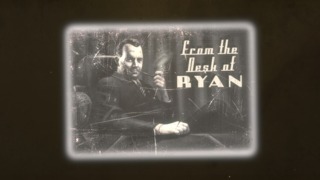
Rand's ideas became influential for many libertarians, conservatives, and generally, supporters of free-market capitalism.[9][10] There have long been right-wing and left-wing intellectuals and fiction writers, but there have never been many philosophers telling you that selflessness is bad and greed is good. For people who believe this, Rand is a figure of worship. She also found a seat in American capitalist spheres partly as a result of the Cold War. Here was a Soviet immigrant gazing back in horror at the system she emerged from while championing capitalism as doggedly as anyone could.[9][11]
It's necessary to be mindful of the lessons that objectivism teaches because this isn't just an ideology that guys in tweed jackets are arguing about in dusty university offices. It's a model of society that's influenced some of the people with the most power over American and UK politics and economics. Alan Greenspan, the Chair of the US Federal Reserve from 1987 to 2006, was famously part of Rand's inner circle and ushered America towards a laissez-faire capitalism consummate with her ideals.[12] Ronald Reagan said he was an admirer of Rand.[13] Paul Ryan, the former Speaker of the House and Head of the House Budget Committee, has described objectivism as formative of his worldview and says that Rand is required reading for all his staff. Three-time US presidential candidate Ron Paul and his son Senator Rand Paul were both inspired by objectivism.[13] So was former CIA Director and Secretary of State Mike Pompeo. Ex-Secretary of State Rex Tillerson named Atlas Shrugged as his favourite book. Donald Trump has recommended Rand's The Fountainhead before, which may not be out of personal experience; it's hard to imagine Trump reading for more than minutes at a time, but he at least knows that in entrepreneurial politics, that's the book you're meant to say you like.[12]
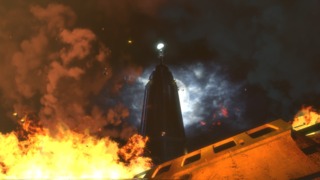
Former UK Chancellor of the Exchequer and Secretary for Health and Social Care Sajid Javid, said that the film adaptation of Rand's The Fountainhead "was articulating what I felt." The same is true of billionaire and Paypal Co-Founder Peter Thiel, who is also trying to fund a private libertarian nation in the middle of the ocean.[12] Apple co-founder Steve Wozniak said that Atlas Shrugged was "a guide" for technology pioneer Steve Jobs. Supreme Court Justice Clarence Thomas loves Rand so much that he screens The Fountainhead film for his staff annually. In the UK, Ayn Rand was made compulsory reading for all A-level politics students. If Rand's worldview is as toxic as her critics claim, then there are people out there who are doing a whole lot of damage with it. Bioshock proposes that if Rand's proposals ever became a reality, society would fall into shambles. It believes it would be "Rapture": the end of the world.
Part II: Rapture
Bioshock first released in 2007, and the most important things to understand about it are that its sunken city of Rapture is Galt's Gulch and that the initial antagonist, Andrew Ryan, is John Galt. Due to Galt being a Rand self-insert, this transitively means that Ryan is also Ayn. They're both ideologues whose principles were apparently shaped by having the products of their labour taken away from them in Soviet Russia and who fled to America only to become concerned about the dangers of that country not being invested enough in deregulated capitalism.[3][14] Ryan's forename rhymes with Ayn's, and Ayn Rand is a near-anagram to Andrew Ryan. Like Rand, Ryan believes that unregulated "rational self-interest" is what drives society forwards, saying:
"I believe in no God, no invisible man in the sky. But there is something more powerful than each of us, a combination of our efforts, a Great Chain of industry that unites us. But it is only when we struggle in our own interest that the chain pulls society in the right direction. The chain is too powerful and too mysterious for any government to guide."[15]
Rand and Ryan also both believe in free-market competition as a constructive force that the government should not meddle with.[3] When a businessman, Gregory, complains to Ryan about the company Fontaine Futuristics, Ryan retorts with:
"Don't come whining to me about market forces. And don't expect me to punish citizens for showing a little initiative. If you don't like what Fontaine is doing, well, I suggest you find a way to offer a better product."[16]
Rand and Ryan are also united by their intolerance of state benefits and wealth redistribution.[14] As Ryan rattles out in a couple of recordings:
"The parasite expects the doctor to heal them for free, the farmer to feed them out of charity. How little they differ from the pervert who prowls the streets, looking for a victim he can ravish for his grotesque amusement."[17]
"What is the difference between a man and a parasite? A man builds. A parasite asks, "Where is my share?"[18]
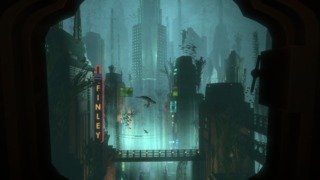
And from Rand:
"The creator originates, the parasite borrows. [...] The creator lives for his work. [...] The parasite lives second-hand."[19]
For John Galt, these beliefs were the impetus for commissioning Galt's Gulch, while the same ideas moved Andrew Ryan to found the libertarian paradise of Rapture. Like Galt's Gulch, Rapture is a gated community for trail-blazing dream-makers to move mountains unimpeded by their peers or by religious or governmental authority. Ryan most famously summarises this vision in his opening speech:
"Is a man not entitled to the sweat of his brow? "No," says the man in Washington, "it belongs to the poor." "No," says the man in the Vatican, "it belongs to God." "No," says the man in Moscow, "it belongs to everyone." I rejected those answers. Instead, I chose something different. I chose the impossible. I chose Rapture. A city where the artist would not fear the censor. Where the scientist would not be bound by petty morality. Where the great would not be constrained by the small."[20]
Just as the inventors under Galt use futuristic electronics to hide Galt's Gulch, the engineers serving Ryan do the same with Rapture. Rapture is a subaquatic city of gleaming skyscrapers sunken into the bed of the mid-Atlantic. Compare this to Atlas Shrugged, where Galt's Gulch is an analogue for an Atlantis of resplendent towers, said to have sprouted after Galt's ship sank in the mid-Atlantic. The difference between Rand's Gulch and Irrational's Rapture is that while the Gulch prospers, when we arrive in Rapture, all social order has disintegrated, and the city is locked in an unending interpersonal war. Bioshock realises what Ayn does not: that saying Galt "went down with his ship" implies a failed venture. The myth of Atlantis was always meant to end in drowning. The earliest sources we have mentioning the island are Plato's Timaeus and Critias, in which he describes it as a utopian island, first ruled by a king named Atlas.[21] Atlantis amasses a vast wealth and superficially appears full of fine, upstanding people, but in truth, their riches had corrupted them. A natural disaster cast the island to the depths of the sea, with the Critias hinting that this was the judgment of the gods.[22]
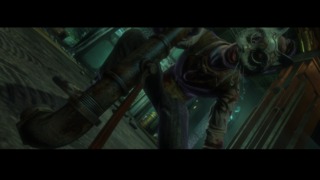
We enter Rapture as "Jack", a courier with no prior knowledge of the city whose plane came down over the settlement. Within, the halls and atria are overrun with Splicers, people who have undergone life-altering genetic mutation through the use of Rapture's revolutionary biotech products. They're well-armed, they can shoot lightning and flame for their hands, and the only way Jack can survive is to fight fire with fire. He warps himself biologically, loots anything not nailed down, and shoots anything that moves.
As Jack, we are as reliant on Atlas as a baby to a parent. Atlas is a working-class hero who knows Rapture like the back of his hand and who lends us his protection in exchange for us trying to save his family. Yet, the more time we spend trying to break the impregnable fortress of Rapture, the more attention we attract from Ryan, who makes it his personal mission to take us out. Over the course of the game, it becomes clear how Rapture fell, which is to say, that over the playtime of Bioshock, the game makes a case for why an objectivist society is doomed to discount the wellbeing of its citizens, and ultimately, implode because it does.
Part III: Happy New Year, 1959
As we collect audio logs, a picture forms of Ryan's free-market utopia failing to provide a foundation for its citizens' creative and business plans due to structural issues in its society. Bill McDonagh is the man who headed much of Rapture's construction, and when severe infrastructure issues arise, he brings it to management's attention, only to have his warnings fall on deaf ears. From the audio log, "Freezing Pipes":
"Steinman, I know Medical Pavilion is your manor, but you might want to cogitate on this: ocean water is colder than a witch's tit. You don't heat the pipes, the pipes freeze. Pipes freeze, pipes burst. Then Rapture leaks. [...] Once Rapture starts leaking, the old girl's never gonna stop. And then I'll be sure to tell Ryan he's got you to thank."[23]
And from "Eden Leaking":
"The irrigation system in Arcadia is taking on seawater. I told Mr. Ryan when we were building this place, either you build her like a bathtub, or she's gonna turn into a sewer. "No, McDonagh," he said, "we're not gonna build no bathtub… We're gonna build Eden."[24]

Disconnected from the manual labour class and serving as a purely abstract economist, Ryan is unable to deal with the fact that his city is a material place. He can only view it as a theoretical, something metaphysical that doesn't exist in the physical dimension: an Eden, Arcadia, or Atlantis. But if your ideology doesn't account for physical realities, it's not worth a damn. As Ryan fails to recognise that his city is somewhere engineered, it falls into disrepair, and everyone pays the price.
We should also note that Andrew Ryan tells us his metropolis is a place for the sharp-minded to capture their dreams, and McDonagh is obviously an intelligent man thinking about the city's stability in the long term. Despite that, he doesn't get to achieve his vision of working plumbing and strong walls because figures more senior than him control the resources necessary for his work. The game gives us another vantage point on this problem with Julie Langford, a botanist who grows for Ryan. Rapture needed a steady supply of oxygen, and so, Ryan hired her to plant a forest in Rapture: Arcadia. Ryan privatises the woods, against the wishes of Langford, but Langford knows she can't safely object to this takeover because Ryan holds power over her by paying her salary:
"Today Arcadia was closed off to all but paying customers. The man hires me to build a forest at the bottom of the ocean, and then turns a walk in the woods into a luxury. Ryan asked, "Should a farmer not be able to sell his food?" "Is a potter not entitled to a profit from his pots?" I started to argue with the man and then I remembered who signed my checks."[25]
Is Langford also not a visionary who, contrary to Ryan's promises, doesn't retain the sweat of her brow? Ryan lording his position over McDonagh and Langford highlights a fault in how he attributes credit for creations. The founder refers to Rapture as "his city", something he built, and given that, Ryan figures that the city, or at very least, Arcadia, is his to do with what he pleases.[26] But we never see Ryan with a trowel or a spanner in his hand. As dock worker, Peach Wilkins points out:
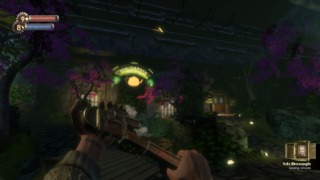
"He's up in Fort Frolic banging fashion models... We're down in this dump yanking guts outta fish."[27]
Bioshock's observations about labour are at odds with how we generally attribute works. It's easy to write that the first automobiles were produced from the desk of a genius Henry Ford, but those cars wouldn't exist if it weren't for the men who formed, screwed, welded, and stitched them into existence. You might win a point in a pub quiz for saying that Michelangelo is responsible for the ceiling of the Sistine Chapel, but what about the people who mixed Michelangelo's paints or constructed the church that became his canvas? What about the workers who fed, clothed, and provided roads for those workers?
Bioshock acknowledges the reality that it's not just the guys they build statues of that have a hand in the most respected human endeavours. Gardeners, plumbers, the people gutting fish, and other workers lower down the totem pole left their fingerprints on them as well. This collective nature of human creation has two fatal implications for objectivism.
- It's not just the "great men" in their studios and executive suites that make our grandest discoveries and constructions possible. Therefore, we can't say that civilisation must sacrifice everything at the feet of those men to be able to perpetuate and better itself.
- In Randian ethics, creators of works should retain ownership of those works and any profit derived from them. However, if all these people beyond the commissioners and architects had a hand in them, then shouldn't those labourers be joint owners of the products and services? Rand's logic would seem to lead us right into the arms of the socialism she abhors.[28] Stubborn in the face of these contradictions, Ryan uses his tremendous wealth to absorb other peoples' enterprises into his own. He becomes the pervasive appropriator of others' property that he and Ayn accuse their ideological opponents of being.

Even this inequality is still Rapture at its most just because we're describing the city pre-collapse. The end begins with Frank Fontaine, a shrewd businessman and head of the biotech company Fontaine Futuristics. One day, his researcher, Brigid Tenenbaum, discovers that a species of Sea Slug living near Rapture excretes a chemical they come to call ADAM. ADAM has the potential to reprogram human DNA. So begins a line of products, "plasmids", which grant people superpowers through selective mutation.[29][30]
As we experience through the gameplay systems, ADAM is effectively a genetic currency that allows users to "purchase" plasmids into their bodies. As the demand for this mutagen surged, Tenenbaum proved that she could up the ADAM yield from slugs by implanting them in pre-pubescent girls. Fontaine effectively kidnapped subjects for this procedure by setting up a franchise of fake orphanages. The girls hosting the molluscs were called "Little Sisters", with the company recovering its genetic potion from them by inducing vomiting.[31] The name of the Little Sisters is an inversion of George Orwell's "Big Brother". If Big Brother is the ultimate authority, then the Little Sisters are the ultimate victims of authority. They also play with the idea of the worker in a right-libertarian society being not just exploited but infantilised.
As it transpired, overuse of plasmids causes psychosis in its users, but Fontaine Futuristics pushed on, regardless, with the Little Sisters programme kept under wraps.[31][32] As an increasing number of citizens were left impoverished by Ryan's cutthroat economics, Fontaine also opened up homes for the poor in an attempt to win the hearts of the hungry.[33] When the market again dictated that the supply of ADAM sharply increase, Fontaine's biologist Yi Suchong worked out that he could psychologically condition Little Sisters to scavenge ADAM from dead bodies. Suchong grafted Splicers into diving suits, "Big Daddies", and assigned them the duty of protecting Little Sisters from anyone who'd kill a Little Sister to sup the ADAM within.[32][34][35]
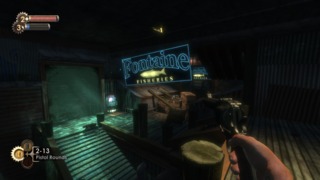
With the most prized resources and commodities on lock, Fontaine had created a monopoly that was eating Ryan's lunch.[33][36][37] He'd also been running a side operation via the city docks, smuggling in contraband from the surface, which was really just any product from the surface. Ryan forbade contact with countries outside Rapture as it had the potential to expose the city and open it up to the regulatory processes he so despised. He instituted a controversial death penalty for smugglers, and later, ordered a raid on Fontaine Fisheries, causing a shootout which, to outside observers, killed Fontaine.[36][38][39][40] In actuality, Fontaine escaped and established a new identity as Atlas, the leader of the anti-Ryan resistance. "Who is Atlas?" became a ubiquitous phrase around the city, just as "Who is John Galt?" did in Atlas Shrugged's US.[41][42]
To reassert his control over Rapture's economy and fill the empty chair at the head of Fontaine Futuristics, Ryan assumed ownership of the firm. He did this against the best advice of McDonagh, who told him to deliver Rapture to Atlas's supporters.[37][43][44] Ryan had turned a blind eye to Rapture's poverty and instituted capital punishment; the people were already losing sympathy for him.[16][27][39][45] When he, as head of state, took Fontaine Futuristics, it was a betrayal of the principles he founded the city on, and it became the final straw. A faction became convinced that Ryan had nothing to offer the people, while Fontaine/Atlas promised refuge and empowerment.[33][40][42][43][46][47][48][49][50]
With the business that manufactured ADAM under his belt, Ryan's eyes were opened to the secret of the Little Sisters. He was disturbed by this discovery but wasn't going to knock out the axles of the economy.[51] When Rapture's best and brightest met at a New Year's Eve party in the Kashmir restaurant, Atlas's people bombed the establishment, lighting the touchpaper of civil unrest. On December 31st, 1958, a riot started in Rapture and never stopped.[48][52] Because progress in the city stopped hard at this verge of the calendar flipping over, there's this theme of it being pregnant with a future that never arrives. As civil war gripped the city and plasmids became the weapons of that war, Ryan shut himself away behind a series of security measures that would respond only to his genetic code, creating a stalemate between him and Atlas.[24][44][49][53][54][55][56] It was time for Atlas to trigger his ace in the hole.
Part IV: The Ocean on His Shoulders
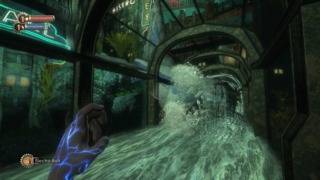
Bioshock makes considerable use of irony to criticise objectivist ideals. In the Ancient Greek myth of Atlas, Atlas is a titan that holds up the heavens. In Atlas Shrugged, it is the captains of industry that embody Atlas: they carry a great weight on their shoulders. If they should ever shake off that weight, the sky would fall in on society, which is what happens: Galt and his ilk leave America to languish; Atlas shrugs. In Rapture, the sky also appears to be falling. The city is under water pressure in a similar way that it is under social and economic pressure, and eventually, its knees buckle, and it succumbs. Rapture's sky comes gushing in through the glass panes. Lots of video games have buildings with cracks and holes, but Bioshock draws attention to these fractures by having water spurt like blood from them and distort your vision if it enters your eyes.
In Bioshock, unlike in Rand's novel, the sky doesn't fall in because of the absence of elites or excessive shackling of them. Instead, it's because of the toxic exploitation of elites and the lack of any safeguards against it. In fact, the ones screwing together the tubes which held up Rapture's sky were the manual labourers like Bill McDonagh. It's similarly implied that Rapture's construction yielded to the ocean because big wigs like Steinman and Ryan didn't listen to McDonagh when he told them its pipes were bursting. This neglect mirrors Ryan's purposeful ignorance of the discontent in the city and how it comes back to bite him. In line with objectivist reasoning, Ryan thinks that as long as he placates Rapture's ivory tower, the wheels of the civilisation will stay greased. Bioshock points out that you need more than champagne for the upper crust to keep a society ticking over. It does that by showing that a society might implode because its leaders agitate the average joes to the point that they rebel.
That agitation is a triad of Ryan failing to shelter Rapture's most fragile, Atlas playing the poor off against Ryan, and Ryan's hypocrisy earning the ire of his former supporters. Now, maybe you could argue that another objectivist could stick to their principles over their greed and not swat the invisible hand of the market as Ryan does. But Bioshock indicates a conflict between Rand's belief in a free market and her belief that everyone must be able to pursue "rational self-interest". If you're an industrialist who wants to make maximum profit, it's in your interests for the market not to be free but to be forced to make the decisions that benefit you. If you want to maximise profits, your economic goal is in conflict with that of everyone else trying to do the same. At those divergences, one person must quash another person's ability to act selfishly.
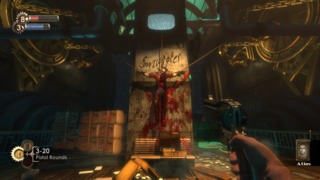
Because altruism is forbidden, it's justifiable for you to use any means to pursue that profit, including the state intervention that objectivism rules out. It is in Ryan's self-interest to move into Fontaine's old business like a hermit crab and to overrule Langford's policy for Arcadia. If he didn't abuse his seat at the head of government to do this, he would violate the Randian prioritisation of rational self-interest. Yet, if he does bring the might of the state down on Fontaine and Langfords' heads, then he violates the Randian prohibition against imposing limitations through the government.
On the obverse side, Fontaine's business strategies show that charity and self-interest are not mutually exclusive. Fontaine, and plenty of other capitalists, invest both in products and in winning hearts and minds, giving them a bigger slice of the market. He provides another parable of irreconcilable conflicts in objectivism. Objectivism says Fontaine should pursue his interests, which involve integrating charity into his business, which is against Ayn's rules, but if he dropped the philanthropy, he wouldn't be selfishly pursuing his own ends, which is also what objectivism orders.
A few times, it's also the case that allowing go-getters to build the business that they want and permitting unfettered market competition are two diktats at odds with each other, even without the state involved. Promoters of free-market economics often say that market competition is the enabler of businesspeople, but in Rapture, we can see how that might not be true. Fontaine's monopoly blocks other entrepreneurs who wish to take a bite out of the market, and we hear that in the shopkeeper Gregory being run out of business by him. Later, the game opines that with a large enough sack of capital, even a Randian visionary like Ryan might be smothered under the weight of an economic competitor.
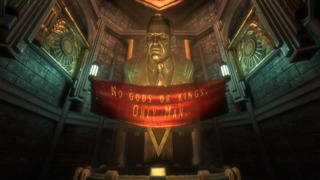
While Ryan employs a rabidly right-wing approach to economics, his reasoning actually starts with the same worry as many of those with radically left-wing economic stances. Looking in our rearview to the opening speech, we see Ryan is concerned about the appropriation of labour. He's worried about powerful people hijacking labourers' work and taking the products of it from them. He's scared of those products being stolen by the state, by the church, and even by the population. A statue of him appears at the entrance to Rapture, holding a banner that reads "No gods, no kings, only men". This is very similar to the old anarchist slogan, "No gods, no masters".[57] Yet, unlike the left, Ryan never stops to consider that peoples' opportunity to work and possess the result of that work could be impinged on by other businesspeople. Bioshock says that it's this blindspot in objectivism, which means that Randian trailblazers can become the exact tyrants that Ayn is claiming to free people from.
Another irreconcilable conflict of Randian thinking: How do you reinforce objectivist behaviour if a lack of state intervention is one of the pillars of your philosophy? I don't want to caricature Rand; she wouldn't have approved of Atlas's use of deceit to summit Rapture's markets. Rand believed that lying was categorically wrong as, according to her, honesty is a virtue.[3] However, it's not clear how Rand or Ryan would resolve the fact that the lies are part of Fontaine's entrepreneurial vision. And if you're going to rule out the possibility of government oversight or regulation, it doesn't matter how much you believe people should tell the truth or avoid inserting safeguards into a market; you don't have a way for the societal apparatus to check what companies are doing or to curtail any anti-free market behaviour.
Similarly, there's Ryan's conundrum of how to rule on Fontaine Fisheries' smuggling operation. If Ryan doesn't stop Frank's men, then perhaps the surface world finds Rapture and tries to insert some guard rails into its economy, which would violate objectivist guidelines. On the other hand, if Ryan does stop Frank's traffickers, then he's the governmental entity regulating the business of the country, which is also anti-objectivist. All these paradoxes demonstrate that the problem is not just that Ryan is doing objectivism wrong but that no one could do it right. Rand will never get her Atlantis, and Ryan will never get his Arcadia or Eden because these places are myths. As Ryan told us, he "chose the impossible"; he chose the end of the world.
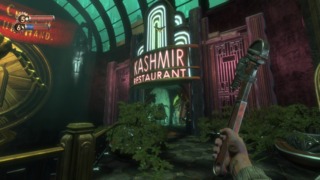
Ayn and Andrew idolise the image of the CEO messiah who will deliver the market the product that revolutionises life in their society. In Bioshock, the Rand stand-in gets their dream, they get their Atlas, but far from this person bringing about a libertarian utopia, a real-life Atlas turns out to be their worst enemy. When Bioshock tests objectivism's ability to coexist with a radically successful owner of inventions like Galt, it fails that test disgracefully. Too late, it dawns on Ryan why market regulation might be helpful, and he is beyond the point of being able to implement it successfully. And, of course, once Rapture's civilisation has devolved into a rabble, there's very little opportunity to develop stable art, business, or anything else Rand or Ryan view as the golden apples of human struggle.
Post-downfall Rapture is particularly grotesque, because even in life, it was designed as a honeypot for ambitious egoists. J.S. Steinman is a surgeon who, without medical oversight, can use strangers as human guinea pigs. Sander Cohen is an artist who, given that there is no regulation on him, can kill and make corpses part of his pieces. The attitudes of opportunists like Cohen and Steinman during this wartime mirror the philosophy of the peacetime city. Even if these men weren't hacking apart their fellow Rapturites pre-collapse, they were still rewarded for taking what they wanted without regard for other people. By making Steinman and Cohen bosses (in the game design sense), Bioshock makes us confront that individualist attitude.
Bioshock has been accused of being a game featuring objectivism but not about it. We can mount an attack saying that the game's audio diaries and our few encounters with its antagonists are caches of philosophical content while the engine of the experience is a first-person shooter system which has nothing to do with its political polemicism. I have to disagree; the stock smash-and-grab loops of modern action games map disturbingly well to the animuses of objectivists. Ryan dreams of a society in which competition is king, money is made only through individualistic enterprise, and there are no protections for the vulnerable. He tells us that these societal struts will bring about a state of freedom and utopianism. What we do in Bioshock's gameplay is to also compete with other residents of the city, taking their share of money wherever possible and realising our goals through it. But this is not a path to utopia. It is a setup where people on the street who we might otherwise pay no mind become our sworn enemies as there is the chance to gun them down, and through that predation, earn a bit more.
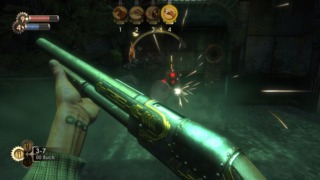
The game also leverages the commonality of items to tell you what it's like to live in Rapture. Like most games with inventories, Bioshock is replete with containers that we can search for loot. Yet, where other titles using looting mechanics ensure that those containers cough up items regularly, it's surprising how many crates in Bioshock have nothing in them or only a few dollars. It emphasises that the bones of the city are being picked clean and reinforces the necessity of dominating other citizens to get the materials you need to survive. An economic feedback loop means that the powerful get more powerful, and elite individuals like Jack, Steinman, and Cohen control inordinate amounts of power within the country while everyone else scrounges in the rust or just dies off. And the accumulation of wealth warps them as people. ADAM, Rapture's genetic currency, mutates the body and defiles the mind.[32] While violence is decoration in the bulk of games that use it, Bioshock employs gore to reinforce how wanton the concept of an intensively competitive society is.
The Little Sisters, too, have their part to play in this satire. Ryan's primary economic concern is parasitism, even while he and his peers feed off of the achievements of men and women below him. The Little Sisters are a literalisation of this irony: Atlas maintains his business empire by sucking the genetic currency from Rapture's citizens like a vampire and taking it from the Little Sisters, the workers who are the ones actually generating it. He's literally vomit-inducing. It's not that Fontaine didn't have a hand in the production of ADAM. However, under a Ryanist philosophy that credits products only to inventors and businesspeople, and that includes no worker protections, Fontaine receives almost all of the reward. In truth, he is the parasite.
The game gives us the choice to follow in Ryan and Fontaine's footsteps or to pave a new ideological path. When we accost Little Sisters, the designers ask us whether we want to "Rescue" or "Harvest" them. Rescuing consists of severing their bond to the sea slug, turning them back into human girls, and earning us a small ADAM reward. Harvesting means killing the child and showering in the vast store of mutagens inside, assuming Ryan's winner-takes-all philosophy. This, at first, appears to be a purely moral choice: one of whether you want to do the right thing or the profitable thing, but remember Bioshock's message that "rational self-interest" is often not the most lucrative motivation to pursue in the long run. Sure enough, if you rescue the Little Sisters rather than harvest them, you see only a minor drop-off in ADAM, and you get all sorts of bonus rewards like more First Aid Kits and the coveted "Hypnotize Big Daddy" plasmid.
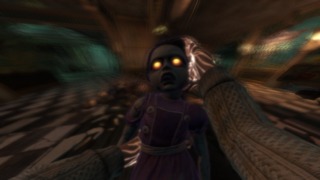
These goodies come care of Brigid Tenenbaum, who had a change of heart, and post-apocalypse, makes it her mission to save the surrogate daughters she conceived. If you help her do this, she pays you intermittently. Feeding your greed seems like a fine idea in the moment, but alienating other citizens loses you their support and so, potentially the resources they could lend you. Although, as developer Clint Hocking famously observed, the game does somewhat betray its message by making repeated theft of the Little Sisters' profits sustainable. The broad message of Bioshock is that individualism is socially untenable, but in the play, it never is; it's just suboptimal.
Part V: Would You Kindly?
We're talking a lot about altruism and objectivism, solidarity and economies, but it's also Bioshock's reputation that it's a game about games. Even among players who weren't interested in ludonarrative analysis, a clear metaphor emerged from Irrational's FPS: it was laying bare game designers' ability to manipulate us and our slavish obedience to them. Because there is more to Jack and Atlas's story. Andrew Ryan impregnated exotic dancer Jasmine Jolene, and Jolene sold their zygote to Fontaine Futuristics.[58] Fontaine then had his doctors, raise the fetus as an ubermensch conditioned by pokes with a sharp psychological stick. Whenever Fontaine would begin a request with "Would you kindly?", the boy would be compelled to carry it out. That boy grew into Jack, our protagonist.[59][60]
It was Atlas contacting Jack with the "Would you kindly?" trigger that forced him to bring down a plane over Rapture.[60] Throughout Bioshock, Fontaine uses the "WYK?" prompt before telling us to carry out various jobs, although the player is likely to dismiss the "WYK?" trigger as an incidental speech tick or may not notice it at all. The objectives we receive in-game often pop up after Atlas issues us a WYK command, and just to reinforce how irresistible this psychological urge is, an enormous arrow appears at the top of the screen, directing us to our next duty. Jack can be Atlas's solution to the stalemate in Rapture because, being Ryan's son, Ryan's genetic locks will open for him. It's about the time we reach the office of Rapture's dictator that we learn about our conditioning.

Once we're face to face with Ryan, he knows it's too late to save himself. We've pulled his drawbridge down for Atlas and his lackeys to cross, but Ryan can have his revenge by showing us that we lack free will. He asks to "kindly" kill him, and as we cave in his head with a golf club, he repeats his axiom "a man chooses, a slave obeys". This motto is a hair's breadth from a statement Rand makes in The Fountainhead:
"The creator stands on his own judgment. The parasite follows the opinions of others."[19]
To underscore Jack's dearth of agency, this section is carried out without our control and cannot be overridden or affected through our use of the sticks or buttons. After we dispose of the big bad, Atlas reveals his deception to us. So, one read we could make of the game is that Ryan's false promise of economic liberation mirrors the false promise of video games, at least linear video games.
Ryan promises us a paradise where we can realise whatever plan we may want, but what we get is a state of slavery. Similarly, we think of video games as being driven by our intention. In interactive entertainment like Bioshock, we can choose the protagonist's inventory, abilities, and combat strategies, and doesn't that mean that we have control? Maybe not to the extent we'd think. While we have power over how we pursue our goals, those goals are set for us by someone else. We're slaves to the designers, who are played here by Ryan and Atlas. The designers' control is embodied by the WYK.
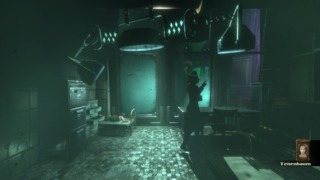
What's wrong with this interpretation is that after Atlas reveals his true identity of Fontaine, we are cured of the WYK but continue to be dragged along by the tow of the in-game objectives. Atlas attempts to sweep up Jack using armed forces and by psychologically manipulating him into danger, but Tenenbaum interrupts, helping Jack annul Suchong's conditioning with the hope that he can go on to kill Fontaine. Therefore the WYK cannot be a metaphor for designers instructing us. If there is an analogy behind this conditioning, we must find it by seeing what in the game is present when the mental trigger is active that is missing after it is expunged. The difference between our pre-deprogramming state and our post-deprogramming state is whether we believe in Fontaine's false persona of Atlas. It is almost the moment that the wool is pulled from our eyes that we are psychologically freed.
Part VI: Who is Atlas?
Our personal journey with Atlas and Ryan mirrors the city's history with them. Ryan sells us Rapture as a setting that will bring us liberty. He conjures the image of "The Great Chain" as a mechanism that pulls Rapture forwards, and we see that Jack is imprinted with this hieroglyph: he has a nautical "chain" tattoo across his wrists. But a chain doesn't just pull; it's also able to bind and imprison, which is what Ryan ends up doing with it. In Atlas Shrugged, the character of Hank Reardon, an industrialist, forges a chainlink bracelet for his wife, Lillian. He crafts this bracelet from the metal on which he made his fortune, but his wife does not share his value system.[61] She describes the accessory as "the chain by which he holds us all in bondage."[62] Rand wants us to side with Hank, but Bioshock wants us to sympathise with Lillian. Andrew Ryan, the man who starts off by telling us that he will give us the sweat of our brow, ends up screaming at us that we have no free will as we shatter a man's skull for our boss.
Yet, Bioshock's criticism of market economics goes beyond excoriating explicit objectivists and also stands alarmed at the damage a more insidious type of capitalist can do. Atlas finds us at a moment when we are vulnerable to Ryan's forces and the terror he has wrought on Rapture, and he claims that he wants to help us. We have no reason not to believe in his presentation as a working-class ally, and our interests seem to be aligned in our desires to defeat Ryan. Just as Fontaine appears to philanthropise through his orphanages and homes for the poor, we appear to receive free help from him through him guiding us through Rapture and dispensing cost-free upgrades at his "Power to the People" stations. All of Rapture's other vending machines charge for the products they stock.
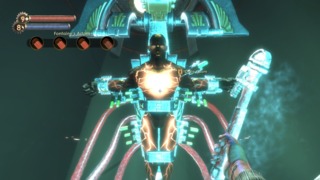
Both we and Rapture are hoodwinked; Atlas works for no one but himself, and none of his "charity" is really charity when it's all in service of helping him grow his power. By the time the illusion is dispelled, we're beyond the point of no return; Fontaine has bled us dry and left us for dead. In many ways, Fontaine is more dangerous than Ryan. Ryan is a plutocrat who wears his evil on his sleeve, but Fontaine adopts the language and presentation of a man of the people while effectively feeding on the populace the same way that a despot like Ryan does. Such a serpentine capitalist is harder to identify as a threat, and therefore, harder to resist.
As dystopian as Rapture is, Bioshock still proposes an escape route from a free-market society. The person who rescues us from Atlas is Tenenbaum, the one closest to the Little Sisters: Rapture's most exploited workers. They've been conditioned to hoard the city's valuable commodities for their owners, and so, like us/Jack, were also robbed of their free will. We will confront Atlas at the end of the game, but in the period between him betraying us and that final boss fight, we spend a fair bit of time in the laboratories where the Little Sisters were created, getting to understand them and just how horribly they've been treated. We must undergo a radical transformation into a protector of these labourers, becoming a Big Daddy. Like most transformations, it is painful, but after it, we can gain the trust of the Little Sisters and have them unlock Fontaine's sanctuary from the inside.
There, Fontaine has used his genetic engineering technology to turn himself into a figure representing the mythological Atlas, as he appears on the iconic cover of the 35th Anniversary Edition of Atlas Shrugged.[63] Seeing a human being twisted into this form doesn't make him appear as a superman; he looks like a caricature of masculinity, reflecting a belief that this amoral pioneer figure, which Rand sees as a hero, is actually an abomination. Jack softens up this living statue, but it's the Little Sisters who finish him off, us all sapping Atlas's ADAM with our syringes. Bioshock suggests that we can retake wealth from capitalists by turning the workers' tools and labour power against them.

Whether we get the "good" or "bad" ending to the story is contingent on whether or not we rescued or harvested the Little Sisters. In the event that we farmed them, we become a monster, surfacing to a voiceover that implies we go on to commit some sort of genocide. If, instead, we save them, we live the rest of our lives alongside the Little Sisters, and the final shot of the game is a dying Jack's hand being held by those of multiple (now adult) Little Sisters. One frame in this cutscene mirrors Michelangelo's The Creation of Adam, suggesting that for all the grand mythical invocations in Rapture of Atlas, Apollo, Adam, and so on, it's in this unification with the girls that we witness the creation of people. Bioshock believes in allyship with labourers to the extent that the difference between whether we are a ghoul or whether we are divine, whether we are an adversary of the rest of humanity or whether we are loved, is the difference between exploiting workers and aiding them.
----
Let's round this out. Bioshock cannot be an exposé on a manipulative relationship between designer and player because the metaphors that are meant to express that relationship do not endure for the whole game, even while the relationship does. Instead, Bioshock's horrors are socioeconomic. It deconstructs the violence and internal contradictions of the all-too-influential objectivism. It also extends past criticism of Rand's writings to reveal the danger of "benevolent" capitalism as a response to objectivism. Bioshock is an explainer of why we have businesses giving to charity and making supportive statements about the vulnerable instead of a bunch of workhouses shrieking, "I am going to leave you to die in the street, even if you threaten a revolution." You make more allies with a mask of altruism than you do by revealing yourself as a greedy tyrant. But Bioshock also says the current societal construction is not destiny. By coming to understand the exploited and turning the tools of tyrants against them, citizens can be set free, not just from a Ryan, but also an Atlas. Thanks for reading.
Notes
Some parts of Bioshock's backstory are evidenced partly or wholly by in-game audio logs or very brief monologues. It is easy to miss some of these expository sections or to lose track of which log or monologue evidences which story beat. Therefore, I provide a number of citations for "Bioshock" here, in which the exact source I am listing is an audio diary or other communication in the game. When referencing The Fountainhead and Atlas Shrugged, I give a full reference to each work once, and each subsequent citation uses the edition in that initial reference.
- Rand, A. (1971). The Fountainhead. The New American Library, Inc. (p. 680).
- Ayn Rand by Brian Duignan (December 30, 1999), Britannica.
- Ayn Rand by Neera K. Badhwar and Roderick T. Long (Jul 13, 2020), The Stanford Encyclopedia of Philosophy.
- Rand, A. (1957). Atlas Shrugged. Random House, Inc. (p. 153, 633, 637, 701, 801, 812, 813, 921, 956, 960, 1002, 1003, 1057, 1096).
- Ibid. (p. 153).
- Ibid. (p. 1009-1069).
- Rand, A. (1964). The Virtue of Selfishness: A New Concept of Egoism. NAL Penguin, Inc. (p. Basically, the whole thing).
- Rand, A. (1967). Capitalism: The Unknown Ideal. The New American Library, Inc. (p. 29-30).
- 114 Years After Her Birth, Ayn Rand’s Supporters Think Russia Is Ready for Her Ideas by Daniel Kozin (February 14, 2019), The Moscow Times.
- How Ayn Rand Became Libertarians’ Sociopathic Pixie Dream Girl by Jill Filipovic (July 20, 2015), Vice.
- Ayn Rand's Counter-Revolution by Jennifer Burns (April 24, 2017), The New York Times.
- The new age of Ayn Rand: how she won over Trump and Silicon Valley by Jonathan Freedland (April 10, 2017), The Guardian.
- One nation under Galt: How Ayn Rand's toxic philosophy permanently transformed America by Bruce E. Levine (December 15, 2014), Salon.
- Rand, A. (1990). The Voice of Reason: Essays in Objectivist Thought. The Penguin Group (p. 42).
- Bioshock. Audio Diary: The Great Chain, Andrew Ryan.
- Bioshock. Audio Diary: Offer a Better Product, Andrew Ryan.
- Bioshock. Audio Diary: Parasite Expectations, Andrew Ryan.
- Bioshock. Audio Diary: A Man or a Parasite, Andrew Ryan.
- The Fountainhead, (p. 681).
- Bioshock. Opening Speech, Andrew Ryan.
- Plato, Translated by: Taylor, A.E. (1929). Timaeus and Critias. Methuen & Co, Ltd. (p. 22-23, 117).
- Ibid. (p. 23, 127-128).
- Bioshock. Audio Diary: Freezing Pipes, Bill McDonagh.
- Bioshock. Audio Diary: Eden Leaking, Bill McDonagh.
- Bioshock. Audio Diary: Arcadia Closed, Julie Langford.
- Bioshock. Hephaestus Radio Messages: Rapture Will Thrive, Andrew Ryan.
- Bioshock. Audio Diary: Meeting with Fontaine, Peach Wilkins.
- Rand, A. (1961). For the New Intellectual. The New American Library, Inc. (p. 43, 46).
- Bioshock. Audio Diary: ADAM Discovery, Brigid Tenenbaum.
- Bioshock. Welcome to Rapture Radio Messages: Genetic Code Rewritten, Atlas.
- Bioshock. Audio Diary: Mass Producing ADAM, Brigid Tenenbaum.
- Bioshock. Audio Diary: ADAM Explained, Brigid Tenenbaum.
- Bioshock. Audio Diary: Rapture Changing, Bill McDonagh.
- Bioshock. Audio Diary: Protecting Little Ones, Yi Suchong.
- Bioshock. Audio Diary: Protection Bond, Yi Suchong.
- Bioshock. Audio Diary: Fontaine Must Go, Andrew Ryan.
- Bioshock. Audio Diary: Arresting Fontaine, Bill McDonagh.
- Bioshock. Audio Diary: Fontaine's Smugglers, Brigid Tenenbaum.
- Bioshock. Audio Diary: Death Penalty in Rapture, Andrew Ryan.
- Bioshock. Audio Diary: Guns Blazing, Bill McDonagh.
- Bioshock. Audio Diary: The Longest Con, Frank Fontaine.
- Bioshock. Olympus Heights Radio Messages: The Charity Angle, Frank Fontaine.
- Bioshock. Audio Diary: Fontaine Takes F Futuristics, Bill McDonagh.
- Bioshock. Audio Diary: Genetic Arms Race, Bill McDonagh.
- Bioshock. Audio Diary: Have My Badge, Sullivan.
- Bioshock. Audio Diary: Atlas Lives, Diane McClintock.
- Bioshock. Audio Diary: Meeting Atlas, Diane McClintock.
- Bioshock. Audio Diary: Fontaine's Legacy, Bill McDonagh.
- Bioshock. Audio Diary: Fontaine's Army, Bill McDonagh.
- Bioshock. Audio Diary: Sad Saps, Frank Fontaine.
- Bioshock. Audio Diary: Pulling Together, Andrew Ryan.
- Bioshock. Audio Diary: New Year's Eve Alone, Diane McClintock.
- Bioshock. Audio Diary: Mistakes, Andrew Ryan.
- Bioshock. Audio Diary: Bathysphere Keys, Sullivan.
- Bioshock. Audio Diary: The Vita Chamber, Yi Suchong.
- Bioshock. Olympus Heights Radio Messages: Ryan's Flesh and Blood, Frank Fontaine.
- Guerin, D. Translated by Sharkey, P. (1998). No Gods, No Masters: Book One. AK Press (p. 1-2).
- Bioshock. Audio Diary: Pregnancy, Jasmine Jolene.
- Bioshock. Audio Diary: Fontaine's Human Jukebox, Yi Suchong.
- Bioshock. Andrew Ryan's Office Monologue, Andrew Ryan.
- The Fountainhead, (p. 31).
- The Fountainhead, (p. 43).
- The Accidental Objectivist: Nick Gaetano by Christopher Herbert (December 7, 2011), Interview Magazine.
All other sources linked at relevant points in article.